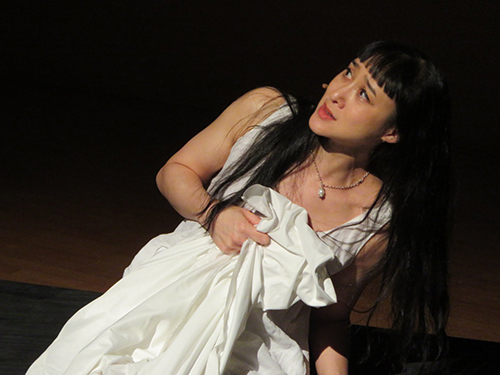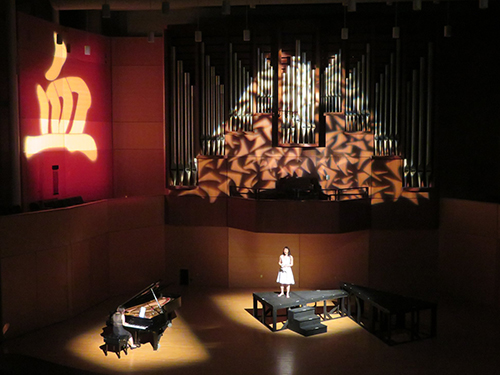by Daniel Hathaway

Schoenberg’s piece is more bizarre because the singer uses pitched speech or Sprechstimme, but Dembski’s soprano, who sings her lines to ravishingly affecting music, is no less haunting. Common themes include blood (“Swords gorged upon corpses, on parade in blood scarlet!”) in the Schoenberg, which sets 21 poems by Albert Giraud, translated from French into German. In the Dembski, which is based on the Chinese folk tale Lady of the Moon, blood serves as the evidence of a miscarriage.
A 40-minute theater piece, Moon in the Mirror received a riveting performance by mezzo-soprano Hai-Ting Chinn and pianist Shuai Wang in Waetjen Auditorium at Cleveland State University on January 31. Produced by CSU’s Andrew Rindfleisch and directed by Christine McBurney, the event was co-sponsored by CSU’s Cleveland Contemporary Players and the University’s Confucius Institute.

The production of a poetry-driven work like Moon in the Mirror poses many of the same challenges as a performance of Winterreise. How do you keep the audience abreast of the story? You can print out the texts and risk having the listeners’ attention shift from the stage to the programs in their laps, or you can provide supertitles — even if a work is sung in the vernacular by a performer whose enunciation is as good as Hai-Ting Chinn’s.

Moon in the Mirror was preceded by Shuai Wang’s expressive performance of Chen Yi’s Northern Scenes, composed for Susan Chan, who premiered the work in 2013. It evokes the blue mountains of the North of China, as well as the strong and passionate character of its people. Wang told the audience that she could relate, being a Northerner herself.
Published on ClevelandClassical.com February 10, 2020.
Click here for a printable copy of this article



